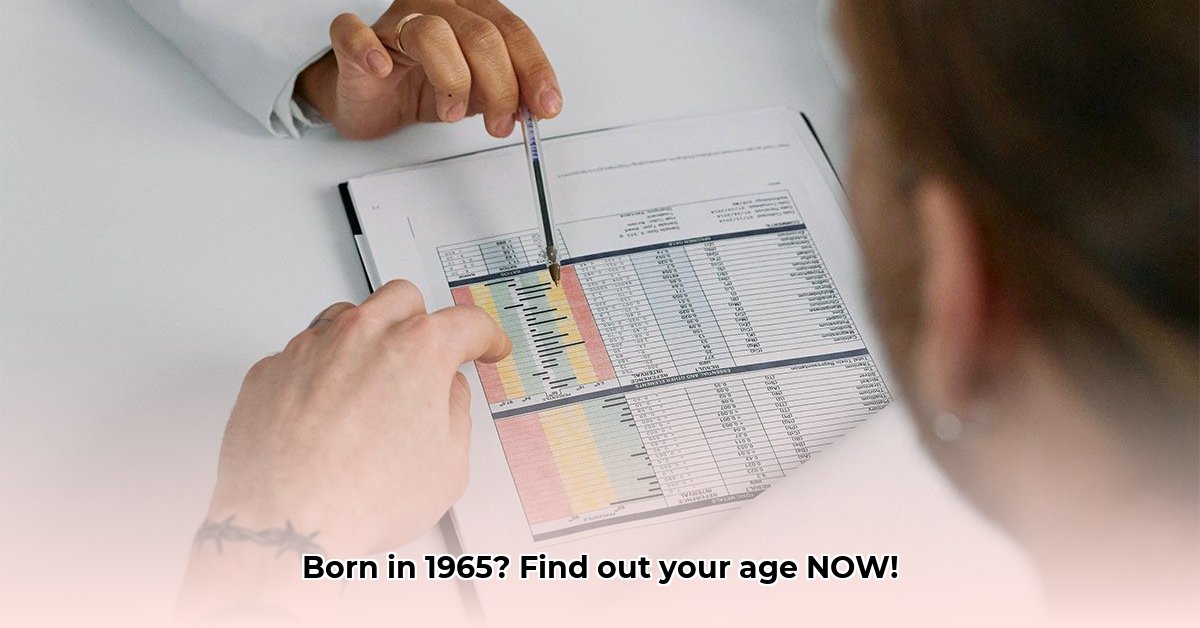
If I Was Born in 1965, How Old Am I?
A simple question with a surprisingly complex answer! If you were born in 1965, you would be 59 years old in 2024. However, precise age calculation involves more than just subtracting birth year from the current year. Let's delve into the nuances. For more on calculating ages born in the 60s, see this helpful guide.
Beyond Simple Subtraction: The Nuances of Age Calculation
While subtracting your birth year from the current year provides a basic age, several factors influence the precision of the calculation:
Birthdate Precision: Your exact birthdate—day and month—affects your age calculation, even down to the number of days, months, or years since your birthday. This simple detail often overlooked leads to discrepancies. Someone born on January 1st is technically older than someone born on December 31st of the same year.
The Leap Year Factor: Leap years introduce an extra day, subtly modifying yearly age calculations. While seemingly insignificant, it accumulates over time, introducing a small but measurable difference in total days lived. Did you know a person born in a leap year actually has one less birthday by one year than they have lived?
Beyond Years: Age isn't solely years; it's a dynamic figure including months, days, hours, and even minutes. The required precision will depend drastically on the application.
Global Variations in Age Perception: Cultures vary in how they conceptualize and measure age. Some use lunar calendars, while others integrate cultural milestones. Understanding this variance is critical for accurate global data analysis. "I’m 59" can have a different meaning when compared to “I've celebrated 58 birthdays.”
Figuring Out Your Age: A Step-by-Step Guide
For a precise age calculation, follow these steps:
Determine the Current Year: As of today, it's 2024.
Perform the Basic Subtraction: Subtract your birth year (1965) from the current year (2024). This yields a preliminary age of 59 years.
Consider Your Birthday: Has your birthday already occurred in 2024? If yes, your age is 59. If not, your age is 58.
Calculate Precise Age (Optional): For utmost accuracy, calculate the elapsed months and days since your last birthday using a dedicated calculator or manual computation, accounting for leap years.
The Challenges of Age Calculation: Why it's More Than Just Math
Building accurate age calculators poses numerous challenges:
| Challenge | Description | Impact |
|---|---|---|
| Leap Year Accounting | Accurately incorporating the extra day every four years | Even small inaccuracies accumulate over time and distort results |
| Cultural Age Definitions | Significant differences exist in how cultures define and measure age (e.g., lunar vs. solar calendars) | Leads to major inaccuracies in global datasets and potential cultural misunderstandings |
| Handling Edge Cases (Month/Day) | Small errors accumulate in age calculations when close to month's end. | Minor, but cumulatively significant discrepancies; more noticeable when analyzing large datasets |
| Time Zones/Daylight Saving Time | Time zone differences and daylight saving time changes introduce subtle variations in calculating age. | Minimal effect in most applications; crucial for extremely precise analyses encompassing global data |
Why Accurate Age Matters: Real-World Applications
Accurate age calculations are far beyond a simple mathematical exercise; they have significant real-world implications:
Healthcare: Age is paramount in healthcare, influencing diagnosis, treatment plans, and risk assessment.
Social Security and Retirement: Eligibility for social security, pensions, and other retirement benefits hinges on precise age determination.
Legal Compliance: Numerous laws hinge on age, making accurate age crucial for legal compliance and fairness.
Research and Statistics: Accurate age data is foundational for dependable population studies, demographic analyses, and forecasting that informs public policy and resource allocation.
How to Account for Cultural Variations in Age Calculation Algorithms
Calculating age is often culturally nuanced. While the Western system predominantly uses years since birth, East Asian cultures typically add a year to everyone's age at the new year. Other cultures employ even more diverse methods:
Data Collection: Ensure consistency by explicitly specifying the age calculation method used in data collection procedures.
Algorithm Flexibility: Create algorithms that account for different cultural methods. Include options allowing users to input the specific age calculation system.
Contextual Awareness: Always present age information within its cultural context. Avoid making assumptions centered on your own culture's norms when analyzing data from other cultures.
Practical Implications of Cultural Considerations
Understanding and accommodating these variations is increasingly important across various sectors:
International Business: Marketing, age-restricted products, and consumer understanding demand culturally sensitive age calculations.
Healthcare: Accurate age is crucial for appropriate medical care and avoiding misdiagnosis.
Legal Systems: Age-related legislation must accommodate varying cultural age definitions.
Social Science Research: Research demands culturally sensitive data collection and analysis to obtain accurate results.
In conclusion, while determining your age from your birth year seems straightforward, understanding the complexities, challenges, and cultural perspectives adds depth and crucial context to this foundational calculation.